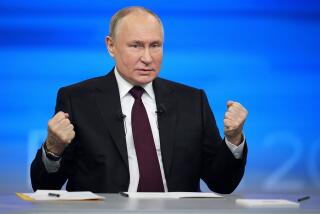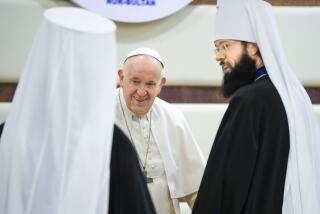Embattled Gorbachev Urges Unity : Soviet Union: He promises that his programs will ‘yield rich fruit for every person.’
- Share via
MOSCOW — President Mikhail S. Gorbachev, in a New Year’s Eve speech to his nation, said that although he supports the momentous steps taken in 1989 toward democracy in Eastern Europe, the watchword in the Soviet Union should be unity.
Gorbachev is facing the toughest challenge ever to his reform program from both breakaway Communists and consumers angered by gaping store shelves. In his speech, he promised his countrymen that action taken by the Soviet government in 1989 will soon “yield rich fruit for every person.”
Gorbachev said that as Eastern Europe moves vigorously along a road to democratic socialism, the Soviet Union’s neighbors should know that they “can always rely on our solidarity.”
But how he will deal with similar pressures simmering at home remains an open question.
In his holiday statement, Gorbachev steered carefully away from his usual criticism of those he says are seeking either to slow down his program of change or push it too fast. But he did stress that “mutual understanding and consolidation” are the two most important things for Soviet society in 1990.
“In the new year, we shall need determination and firmness in our revolutionary work to unite all pro- perestroika forces,” he said, referring to his program of economic and social reform.
The challenge to old-style Communist rule that has erupted over the last several months in Eastern Europe is also hitting Gorbachev at home. In the republic of Azerbaijan on Friday, thousands rallied in the city of Dzhalilabad to protest party officials’ monopoly on power.
After police shot one of the protesters dead and wounded 150 others, the demonstrators attacked government buildings, forcing party officials to flee.
Another trouble spot is Lithuania. Gorbachev, accompanied by high-ranking party officials, plans a trip to the Baltic republic right after New Year’s in an effort to persuade Communists there to overturn an earlier decision to break away from the Soviet Communist Party.
Should he be unable to persuade them with words, analysts say that Gorbachev will surely be under pressure from conservatives to give muscle to his call for party unity. But Gorbechev has repeatly ruled out such use of force.
Gorbachev, without referring directly to these serious challenges, admitted in his speech to the country that 1989 was “the most difficult year of perestroika. “
“We encountered a number of most acute problems,” he said, mentioning the economy, strikes and tensions among many of the country’s over 100 ethnic groups.
Economically speaking, the country is facing one of the bleakest holidays in more than 40 years, since World War II, according to media reports. Distribution of food was stalled just before New Year’s Eve because of a shortage of trucks, according to press reports.
In a rare protest over shortages, demonstrators in the city of Sverdlovsk, 900 miles east of Moscow, blocked traffic on Friday and demanded the resignation of local Communist leaders because of the lack of alcoholic beverages in state stores, it was reported Sunday.
“Tension . . . has been with us throughout the year,” Gorbachev said in his speech.
“We had to reassess much and see many things quite differently now than a year ago,” he said. “We now clearly visualize the goal that we strive to attain. This goal is a humane, democratic socialism, a society of freedom and social justice.”
But continuing on an upbeat note, Gorbachev said: “We are seeing it (the year) off not only with a sense of bitterness but also as a year of great work indispensable for all of us.
“Putting it in a nutshell, the outgoing year has seen the sowing of grains which--and one may have no doubt about it--will bring forth sprouts,” Gorbachev said.
“They are in need of constant care. But if they survive and strike root--and we must see to it--they will yield rich fruit for the entire country and for every person.”
Turning his attention to the international scene, Gorbachev said that 1989 saw the end of the Cold War as well as major shifts in relations between East and West. But he focused on Eastern Europe, which he said was swept by “waves of revolutionary renewal.”
Gorbachev closed with a call for unity.
“While addressing you, dear comrades,” he said, “I have a mental image of millions of people of all nationalities inhabiting the Soviet Union--women, men and children, people of various professions with their own interests, inclinations, plans and hopes for the future--gathering now in front of their television sets awaiting the chimes of the Kremlin clock.
“On the threshold of the new year,” he said, “I would like to wish most of all that it passes under the watchword of mutual understanding and consolidation, which our society and all of us need so much.”
More to Read
Sign up for Essential California
The most important California stories and recommendations in your inbox every morning.
You may occasionally receive promotional content from the Los Angeles Times.













